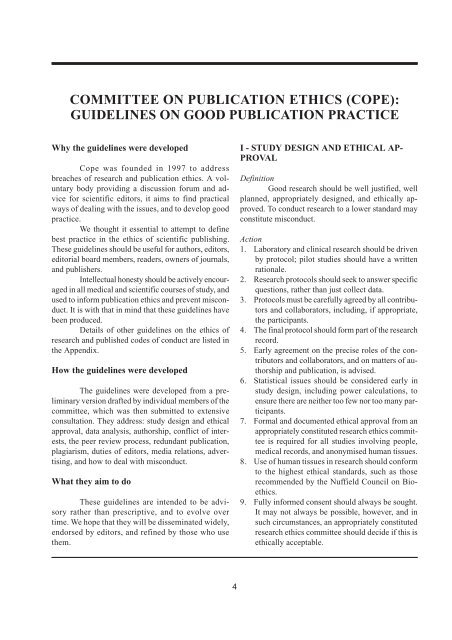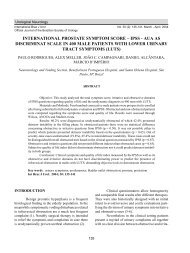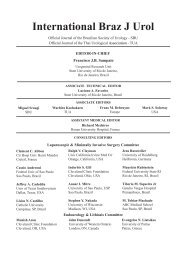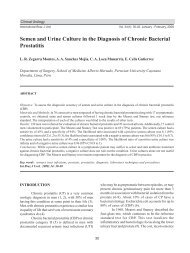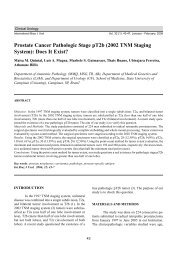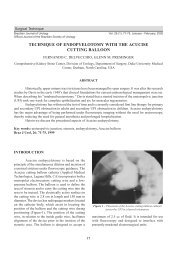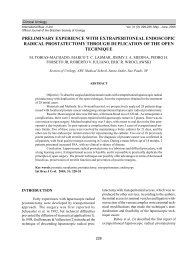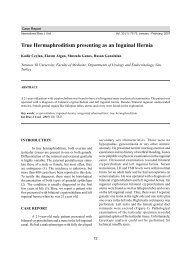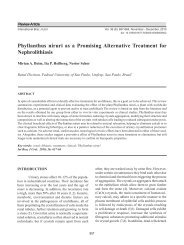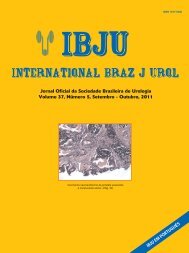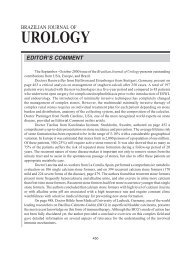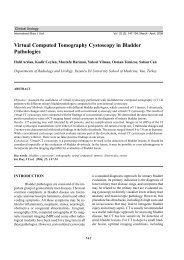committee on publication ethics (cope) - International Braz J Urol
committee on publication ethics (cope) - International Braz J Urol
committee on publication ethics (cope) - International Braz J Urol
Create successful ePaper yourself
Turn your PDF publications into a flip-book with our unique Google optimized e-Paper software.
COMMITTEE ON PUBLICATION ETHICS (COPE):<br />
GUIDELINES ON GOOD PUBLICATION PRACTICE<br />
Why the guidelines were developed<br />
Cope was founded in 1997 to address<br />
breaches of research and publicati<strong>on</strong> <strong>ethics</strong>. A voluntary<br />
body providing a discussi<strong>on</strong> forum and advice<br />
for scientific editors, it aims to find practical<br />
ways of dealing with the issues, and to develop good<br />
practice.<br />
We thought it essential to attempt to define<br />
best practice in the <strong>ethics</strong> of scientific publishing.<br />
These guidelines should be useful for authors, editors,<br />
editorial board members, readers, owners of journals,<br />
and publishers.<br />
Intellectual h<strong>on</strong>esty should be actively encouraged<br />
in all medical and scientific courses of study, and<br />
used to inform publicati<strong>on</strong> <strong>ethics</strong> and prevent misc<strong>on</strong>duct.<br />
It is with that in mind that these guidelines have<br />
been produced.<br />
Details of other guidelines <strong>on</strong> the <strong>ethics</strong> of<br />
research and published codes of c<strong>on</strong>duct are listed in<br />
the Appendix.<br />
How the guidelines were developed<br />
The guidelines were developed from a preliminary<br />
versi<strong>on</strong> drafted by individual members of the<br />
<str<strong>on</strong>g>committee</str<strong>on</strong>g>, which was then submitted to extensive<br />
c<strong>on</strong>sultati<strong>on</strong>. They address: study design and ethical<br />
approval, data analysis, authorship, c<strong>on</strong>flict of interests,<br />
the peer review process, redundant publicati<strong>on</strong>,<br />
plagiarism, duties of editors, media relati<strong>on</strong>s, advertising,<br />
and how to deal with misc<strong>on</strong>duct.<br />
What they aim to do<br />
These guidelines are intended to be advisory<br />
rather than prescriptive, and to evolve over<br />
time. We hope that they will be disseminated widely,<br />
endorsed by editors, and refined by those who use<br />
them.<br />
I - STUDY DESIGN AND ETHICAL AP-<br />
PROVAL<br />
Definiti<strong>on</strong><br />
Good research should be well justified, well<br />
planned, appropriately designed, and ethically approved.<br />
To c<strong>on</strong>duct research to a lower standard may<br />
c<strong>on</strong>stitute misc<strong>on</strong>duct.<br />
Acti<strong>on</strong><br />
1. Laboratory and clinical research should be driven<br />
by protocol; pilot studies should have a written<br />
rati<strong>on</strong>ale.<br />
2. Research protocols should seek to answer specific<br />
questi<strong>on</strong>s, rather than just collect data.<br />
3. Protocols must be carefully agreed by all c<strong>on</strong>tributors<br />
and collaborators, including, if appropriate,<br />
the participants.<br />
4. The final protocol should form part of the research<br />
record.<br />
5. Early agreement <strong>on</strong> the precise roles of the c<strong>on</strong>tributors<br />
and collaborators, and <strong>on</strong> matters of authorship<br />
and publicati<strong>on</strong>, is advised.<br />
6. Statistical issues should be c<strong>on</strong>sidered early in<br />
study design, including power calculati<strong>on</strong>s, to<br />
ensure there are neither too few nor too many participants.<br />
7. Formal and documented ethical approval from an<br />
appropriately c<strong>on</strong>stituted research <strong>ethics</strong> <str<strong>on</strong>g>committee</str<strong>on</strong>g><br />
is required for all studies involving people,<br />
medical records, and an<strong>on</strong>ymised human tissues.<br />
8. Use of human tissues in research should c<strong>on</strong>form<br />
to the highest ethical standards, such as those<br />
recommended by the Nuffield Council <strong>on</strong> Bio<strong>ethics</strong>.<br />
9. Fully informed c<strong>on</strong>sent should always be sought.<br />
It may not always be possible, however, and in<br />
such circumstances, an appropriately c<strong>on</strong>stituted<br />
research <strong>ethics</strong> <str<strong>on</strong>g>committee</str<strong>on</strong>g> should decide if this is<br />
ethically acceptable.<br />
4
10. When participants are unable to give fully informed<br />
c<strong>on</strong>sent, research should follow internati<strong>on</strong>al guidelines,<br />
such as those of the Council for Internati<strong>on</strong>al<br />
Organizati<strong>on</strong>s of Medical Sciences (CIOMS).<br />
11. Animal experiments require full compliance with<br />
local, nati<strong>on</strong>al, ethical, and regulatory principles,<br />
and local licensing arrangements. Internati<strong>on</strong>al<br />
standards vary.<br />
12. Formal supervisi<strong>on</strong>, usually the resp<strong>on</strong>sibility of<br />
the principal investigator, should be provided for<br />
all research projects: this must include quality<br />
c<strong>on</strong>trol, and the frequent review and l<strong>on</strong>g term<br />
retenti<strong>on</strong> (may be up to 15 years) of all records<br />
and primary outputs.<br />
II - DATA ANALYSIS<br />
Definiti<strong>on</strong><br />
Data should be appropriately analyzed, but<br />
inappropriate analysis does not necessarily amount to<br />
misc<strong>on</strong>duct. Fabricati<strong>on</strong> and falsificati<strong>on</strong> of data do<br />
c<strong>on</strong>stitute misc<strong>on</strong>duct.<br />
Acti<strong>on</strong><br />
1. All sources and methods used to obtain and analyze<br />
data, including any electr<strong>on</strong>ic pre-processing,<br />
should be fully disclosed; detailed explanati<strong>on</strong>s<br />
should be provided for any exclusi<strong>on</strong>s.<br />
2. Methods of analysis must be explained in detail,<br />
and referenced, if they are not in comm<strong>on</strong> use.<br />
3. The post hoc analysis of subgroups is acceptable,<br />
as l<strong>on</strong>g as this is disclosed. Failure to disclose that<br />
the analysis was post hoc is unacceptable.<br />
4. The discussi<strong>on</strong> secti<strong>on</strong> of a paper should menti<strong>on</strong><br />
any issues of bias, which have been c<strong>on</strong>sidered,<br />
and explain how they have been dealt with in the<br />
design and interpretati<strong>on</strong> of the study.<br />
III - AUTHORSHIP<br />
Definiti<strong>on</strong><br />
There is no universally agreed definiti<strong>on</strong> of<br />
authorship, although attempts have been made (see<br />
Appendix). As a minimum, authors should take resp<strong>on</strong>sibility<br />
for a particular secti<strong>on</strong> of the study.<br />
Acti<strong>on</strong><br />
1. The award of authorship should balance intellectual<br />
c<strong>on</strong>tributi<strong>on</strong>s to the c<strong>on</strong>cepti<strong>on</strong>, design, analysis<br />
and writing of the study against the collecti<strong>on</strong><br />
of data and other routine work. If there is no task<br />
that can reas<strong>on</strong>ably be attributed to a particular individual,<br />
then that individual should not be credited<br />
with authorship.<br />
2. To avoid disputes over attributi<strong>on</strong> of academic credit,<br />
it is helpful to decide early <strong>on</strong> in the planning of a<br />
research project who will be credited as authors, as<br />
c<strong>on</strong>tributors, and who will be acknowledged.<br />
3. All authors must take public resp<strong>on</strong>sibility for the<br />
c<strong>on</strong>tent of their paper. The multidisciplinary nature<br />
of much research can make this difficult, but<br />
this can be resolved by the disclosure of individual<br />
c<strong>on</strong>tributi<strong>on</strong>s.<br />
4. Careful reading of the target journal’s “Advice to<br />
Authors” is advised, in the light of current uncertainties.<br />
IV - CONFLICTS OF INTEREST<br />
Definiti<strong>on</strong><br />
C<strong>on</strong>flicts of interest comprise those which<br />
may not be fully apparent and which may influence<br />
the judgement of author, reviewers, and editors.<br />
They have been described as those which,<br />
when revealed later, would make a reas<strong>on</strong>able reader<br />
feel misled or deceived.<br />
They may be pers<strong>on</strong>al, commercial, political,<br />
academic or financial.<br />
‘Financial’ interests may include employment,<br />
research funding, stock or share ownership, payment<br />
for lectures or travel, c<strong>on</strong>sultancies and company support<br />
for staff.<br />
Acti<strong>on</strong><br />
1. Such interests, where relevant, must be declared<br />
to editors by researchers, authors, and reviewers.<br />
2. Editors should also disclose relevant c<strong>on</strong>flicts of<br />
interest to their readers. If in doubt, disclose.<br />
Sometimes editors may need to withdraw from<br />
the review and selecti<strong>on</strong> process for the relevant<br />
submissi<strong>on</strong>.<br />
5
V - PEER REVIEW<br />
Definiti<strong>on</strong><br />
Peer reviewers are external experts chosen by<br />
editors to provide written opini<strong>on</strong>s, with the aim of<br />
improving the study.<br />
Working methods vary from journal to journal,<br />
but some use open procedures in which the name<br />
of the reviewer is disclosed, together with the full or<br />
‘edited’ report.<br />
Acti<strong>on</strong><br />
1. Suggesti<strong>on</strong>s from authors as to who might act as<br />
reviewers are often useful, but there should be no<br />
obligati<strong>on</strong>s <strong>on</strong> editors to use those suggested.<br />
2. The duty of c<strong>on</strong>fidentiality in the assessment of a<br />
manuscript must be maintained by expert reviewers,<br />
and this extends to reviewers’ colleagues who<br />
may be asked (with the editor’s permissi<strong>on</strong>) to<br />
give opini<strong>on</strong>s <strong>on</strong> specific secti<strong>on</strong>s.<br />
3. The submitted manuscript should not be retained<br />
or copied.<br />
4. Reviewers and editors should not make any use of<br />
the data, arguments, or interpretati<strong>on</strong>s, unless they<br />
have the authors’ permissi<strong>on</strong>.<br />
5. Reviewers should provide speedy, accurate, courteous,<br />
unbiased and justifiable reports.<br />
6. If reviewers suspect misc<strong>on</strong>duct, they should write<br />
in c<strong>on</strong>fidence to the editor.<br />
7. Journals should publish accurate descripti<strong>on</strong>s of<br />
their peer review, selecti<strong>on</strong>, and appeals processes.<br />
8. Journals should also provide regular audits of their<br />
acceptance rates and publicati<strong>on</strong> times.<br />
VI - REDUNDANT PUBLICATION<br />
Definiti<strong>on</strong><br />
Redundant publicati<strong>on</strong> occurs when two or<br />
more papers, without full cross reference, share the<br />
same hypothesis, data, discussi<strong>on</strong> points, or c<strong>on</strong>clusi<strong>on</strong>s.<br />
Acti<strong>on</strong><br />
1. Published studies do not need to be repeated unless<br />
further c<strong>on</strong>firmati<strong>on</strong> is required.<br />
2. Previous publicati<strong>on</strong>s of an abstract during the<br />
proceedings of meetings does not preclude subsequent<br />
submissi<strong>on</strong> for publicati<strong>on</strong>, but full disclosure<br />
should be made at the time of submissi<strong>on</strong>.<br />
3. Re-publicati<strong>on</strong> of a paper in another language is<br />
acceptable, provided that there is full and prominent<br />
disclosure of its original source at the time<br />
of submissi<strong>on</strong>.<br />
4. At the time of submissi<strong>on</strong>, authors should disclose<br />
details of related papers, even if in a different language,<br />
and similar papers in press.<br />
VII - PLAGIARISM<br />
Definiti<strong>on</strong><br />
Plagiarism ranges from the unreferenced use<br />
of others’ published and unpublished ideas, including<br />
research grant applicati<strong>on</strong>s to submissi<strong>on</strong> under “new”<br />
authorship of a complete paper, sometimes in a different<br />
language.<br />
It may occur at any stage of planning, research,<br />
writing, or publicati<strong>on</strong>; it applies to print and electr<strong>on</strong>ic<br />
versi<strong>on</strong>s.<br />
Acti<strong>on</strong><br />
1. All sources should be disclosed, and if large<br />
amounts of other people’s written or illustrative<br />
material is to be used, permissi<strong>on</strong> must be sought.<br />
VIII - DUTIES OF EDITORS<br />
Definiti<strong>on</strong><br />
Editors are the stewards of journals. They usually<br />
take over their journal from the previous editor(s)<br />
and always want to hand over the journal in good shape.<br />
Most editors provide directi<strong>on</strong> for the journal<br />
and build a str<strong>on</strong>g management team.<br />
They must c<strong>on</strong>sider and balance the interests<br />
of many c<strong>on</strong>stituents, including readers, authors, staff,<br />
owners, editorial board members, advertisers and the<br />
media.<br />
Acti<strong>on</strong><br />
1. Editors’ decisi<strong>on</strong>s to accept or reject a paper for<br />
publicati<strong>on</strong> should be based <strong>on</strong>ly <strong>on</strong> the paper’s<br />
6
importance, originality, and clarity, and the study’s<br />
relevance to the remit of the journal.<br />
2. Studies that challenge previous work published in<br />
the journal should be given an especially sympathetic<br />
hearing.<br />
3. Studies reporting negative results should not be<br />
excluded.<br />
4. All original studies should be peer reviewed before<br />
publicati<strong>on</strong>, taking into full account possible<br />
bias due to related or c<strong>on</strong>flicting interests.<br />
5. Editors must treat all submitted papers as c<strong>on</strong>fidential.<br />
6. When a published paper is subsequently found to<br />
c<strong>on</strong>tain major flaws, editors must accept resp<strong>on</strong>sibility<br />
for correcting the record prominently and<br />
promptly.<br />
IX - MEDIA RELATIONS<br />
Definiti<strong>on</strong><br />
Medical research findings are of increasing<br />
interest to the print and broadcast media.<br />
Journalists may attend scientific meetings, at<br />
which preliminary research findings are presented,<br />
leading to their premature publicati<strong>on</strong> in the mass<br />
media.<br />
Acti<strong>on</strong><br />
1. Authors approached by the media should give as<br />
balanced an account of their work as possible,<br />
ensuring that they point out where evidence ends<br />
and speculati<strong>on</strong>s begins.<br />
2. Simultaneous publicati<strong>on</strong> in the mass media and a<br />
peer reviewed journal is advised, as this usually<br />
means that enough evidence and data have been<br />
provided to satisfy informed and critical readers.<br />
3. Where this is not possible, authors should help<br />
journalists to produce accurate reports, but refrain<br />
form supplying additi<strong>on</strong>al data.<br />
4. All efforts should be made to ensure that patients<br />
who have helped with the research should be informed<br />
of the results by the authors before the mass<br />
media, especially if there are clinical implicati<strong>on</strong>s.<br />
5. Authors should be advised by the organizers if<br />
journalists are to attend scientific meetings.<br />
6. It may be helpful to authors to be advised of any<br />
media policies operated by the journal in which<br />
their work is to be published.<br />
X - ADVERTISING<br />
Definiti<strong>on</strong><br />
Many scientific journals and meetings derive<br />
significant income form advertising.<br />
Reprints may also be lucrative.<br />
Acti<strong>on</strong><br />
1. Editorial decisi<strong>on</strong>s must not be influenced by advertising<br />
revenue or reprint potential: editorial and advertising<br />
administrati<strong>on</strong> must be clearly separated.<br />
2. Advertisements that mislead must be refused, and<br />
editors must be willing to publish criticisms, according<br />
to the same criteria used for material in<br />
the rest of the journal.<br />
3. Reprints should be published as they appear in the<br />
journal unless a correcti<strong>on</strong> is to be added.<br />
Dealing with misc<strong>on</strong>duct<br />
1 Principles<br />
1. The general principle c<strong>on</strong>firming misc<strong>on</strong>duct is intenti<strong>on</strong><br />
to cause others to regard as true that which is<br />
not true.<br />
2. The examinati<strong>on</strong> of misc<strong>on</strong>duct must therefore<br />
focus, not <strong>on</strong>ly <strong>on</strong> the particular act or omissi<strong>on</strong>,<br />
but also <strong>on</strong> the intenti<strong>on</strong> of the researcher, author,<br />
editor, reviewer or publisher involved.<br />
3. Decepti<strong>on</strong> may be by intenti<strong>on</strong>, by reckless disregard<br />
of possible c<strong>on</strong>sequences, or by negligence.<br />
It is implicit, therefore, that ‘best practice’ requires<br />
complete h<strong>on</strong>esty, with full disclosure.<br />
4. Codes of practice may raise awareness, but can<br />
never be exhaustive.<br />
2 Investigating misc<strong>on</strong>duct<br />
1. Editors should not simply reject papers that raise<br />
questi<strong>on</strong>s of misc<strong>on</strong>duct. They are ethically<br />
obliged to pursue the case. However, knowing how<br />
to investigate and resp<strong>on</strong>d to possible cases of<br />
misc<strong>on</strong>duct is difficult.<br />
7
2. COPE is always willing to advice, but for legal<br />
reas<strong>on</strong>s, can <strong>on</strong>ly advise <strong>on</strong> an<strong>on</strong>ymised cases.<br />
3. It is for the editor to decide what acti<strong>on</strong> to take.<br />
3 Serious misc<strong>on</strong>duct<br />
1. Editors must take all allegati<strong>on</strong>s and suspici<strong>on</strong>s of<br />
misc<strong>on</strong>duct seriously, but they must recognize that<br />
they do not usually have either the legal legitimacy<br />
or the means to c<strong>on</strong>ducts investigati<strong>on</strong>s to<br />
serious cases.<br />
2. The editor must decide when to alert the employers<br />
of the accused author(s).<br />
3. Some evidence is required, but if employers have<br />
a process for investigating accusati<strong>on</strong>s - as they<br />
are increasingly required to do – then editors do<br />
not need to assemble a complete case. Indeed, it<br />
may be ethically unsound for editors to do so,<br />
because such acti<strong>on</strong> usually means c<strong>on</strong>sulting<br />
experts, so spreading abroad serious questi<strong>on</strong>s<br />
about the author(s).<br />
4. If editors are presented with c<strong>on</strong>vincing evidence<br />
perhaps by reviewers – of serious misc<strong>on</strong>duct, they<br />
should immediately pass this <strong>on</strong> to the employers,<br />
notifying the author(s) that they are doing so.<br />
5. If accusati<strong>on</strong>s of serious misc<strong>on</strong>duct are not accompanied<br />
by c<strong>on</strong>vincing evidence, then editors<br />
should c<strong>on</strong>fidentially seek expert advice.<br />
6. If the experts raise serious questi<strong>on</strong>s about the research,<br />
then editors should notify the employers.<br />
7. If the experts find no evidence of misc<strong>on</strong>duct, the<br />
editorial processes should proceed in the normal<br />
way.<br />
8. If presented with c<strong>on</strong>vincing evidence of serious<br />
misc<strong>on</strong>duct, where there is no employer to whom<br />
this can be referred, and the author(s) are registered<br />
doctors, cases can be referred to the General<br />
Medical Council.<br />
9. If, however, there is no organizati<strong>on</strong> with the legitimacy<br />
and the means to c<strong>on</strong>duct an investigati<strong>on</strong>,<br />
then the editor may decide that the case is sufficiently<br />
important to warrant publishing something<br />
in the journal. Legal advice will then be essential.<br />
10. If editors are c<strong>on</strong>vinced that an employer has<br />
not c<strong>on</strong>ducted an adequate investigati<strong>on</strong> of a<br />
serious accusati<strong>on</strong>, they may feel that publicati<strong>on</strong><br />
of a notice in the journal is warranted. Legal<br />
advice will be essential.<br />
11. Authors should be given the opportunity to resp<strong>on</strong>d<br />
to accusati<strong>on</strong>s of serious misc<strong>on</strong>duct.<br />
4 Less serious misc<strong>on</strong>duct<br />
1. Editors may judge that it is not necessary to involve<br />
employers in less serious cases of misc<strong>on</strong>duct,<br />
such as redundant publicati<strong>on</strong>, decepti<strong>on</strong><br />
over authorship, or failure to declare c<strong>on</strong>flict of<br />
interest. Sometimes the evidence may speak for<br />
itself, although it may be wise to appoint an independent<br />
expert.<br />
2. Editors should remember that accusati<strong>on</strong>s of even<br />
minor misc<strong>on</strong>duct may have serious implicati<strong>on</strong>s<br />
for the author(s), and it may then be necessary to<br />
ask the employers to investigate.<br />
3. Authors should be given the opportunity to resp<strong>on</strong>d<br />
to any charge of minor misc<strong>on</strong>duct.<br />
4. If c<strong>on</strong>vinced of wr<strong>on</strong>gdoing, editors may wish to<br />
adopt some of the sancti<strong>on</strong>s outlined below.<br />
5 Sancti<strong>on</strong>s<br />
1. Sancti<strong>on</strong>s may be applied separately or combined.<br />
The following are ranked in approximate order of<br />
severity:<br />
2. A letter of explanati<strong>on</strong> (and educati<strong>on</strong>) to the authors,<br />
where there appears to be a genuine misunderstanding<br />
of principles.<br />
3. A letter of reprimand and warning as to future<br />
c<strong>on</strong>duct.<br />
4. A formal letter to the relevant head of instituti<strong>on</strong><br />
or funding body.<br />
5. Publicati<strong>on</strong> of a notice of redundant publicati<strong>on</strong><br />
or plagiarism.<br />
6. An editorial giving full details of the misc<strong>on</strong>duct.<br />
7. Refusal to accept future submissi<strong>on</strong>s from the individual,<br />
unit, or instituti<strong>on</strong> resp<strong>on</strong>sible for the<br />
misc<strong>on</strong>duct, for a stated period.<br />
8. Formal withdrawal or retracti<strong>on</strong> of the paper from<br />
the scientific literature, informing other editors<br />
and the indexing authorities.<br />
9. Reporting the case to the General Medical Council,<br />
or other such authority or organizati<strong>on</strong> which<br />
can investigate and act with due process.<br />
8
Appendix<br />
• The Associati<strong>on</strong> of the British Pharmaceutical Industry.<br />
Facilities for n<strong>on</strong>-patient volunteer studies.<br />
L<strong>on</strong>d<strong>on</strong>: APBI, 1989.<br />
• The Associati<strong>on</strong> of the British Pharmaceutical Industry.<br />
Guidelines for medical experiments in n<strong>on</strong>patient<br />
human volunteers. L<strong>on</strong>d<strong>on</strong>: ABPI, 1990.<br />
• ABPI fact sheets and guidance notes:<br />
Clinical trials and compensati<strong>on</strong> guidelines, January<br />
1991.<br />
Guidelines for phase IV clinical trials, September<br />
1993.<br />
Guidelines <strong>on</strong> the c<strong>on</strong>duct of investigator site<br />
audits, January 1994.<br />
Relati<strong>on</strong>ship between the medical professi<strong>on</strong> and<br />
the pharmaceutical industry,<br />
June 1994.<br />
Good clinical trial practice, November 1995.<br />
Patient informati<strong>on</strong> and c<strong>on</strong>sents for clinical trials,<br />
May 1997.<br />
Guidelines <strong>on</strong> the structure of a formal agreement<br />
to c<strong>on</strong>duct sp<strong>on</strong>sored clinical<br />
research, July 1998.<br />
Good clinical research practice, July 1998.<br />
• Council for Internati<strong>on</strong>al Organizati<strong>on</strong>s of Medical<br />
Sciences (CIOMS). Internati<strong>on</strong>al Guidelines<br />
for Ethical review of Epidemiological Studies.<br />
Geneva: WHO, 1991.<br />
• General Medical Council. Good medical practice<br />
guidelines series:<br />
C<strong>on</strong>sent, February 1999.<br />
C<strong>on</strong>fidentiality, October 1995.<br />
Transplantati<strong>on</strong> of organs from live d<strong>on</strong>ors, November<br />
1992.<br />
• Internati<strong>on</strong>al Committee of Medical journal Editors<br />
(ICMJE). Uniform requirements for manuscripts<br />
submitted to biomedical journals. JAMA,<br />
277: 927-934, 1997.<br />
• Medical Research Council. Policy and procedure<br />
for inquiring into allegati<strong>on</strong>s of scientific misc<strong>on</strong>duct.<br />
L<strong>on</strong>d<strong>on</strong>: MRC, 1997.<br />
• Medical Research Council. The ethical c<strong>on</strong>duct<br />
of research <strong>on</strong> the mentally incapacitated. L<strong>on</strong>d<strong>on</strong>:<br />
MCR, 1991.<br />
• Medical Research Council. The ethical c<strong>on</strong>duct<br />
of research <strong>on</strong> children. L<strong>on</strong>d<strong>on</strong>: MRC, 1991.<br />
• Medical Research Council. Resp<strong>on</strong>sibility in the<br />
use of animals in medical research. L<strong>on</strong>d<strong>on</strong>:<br />
MCR, 1993.<br />
• Medical Research Council. Resp<strong>on</strong>sibility in the<br />
use of pers<strong>on</strong>al medical informati<strong>on</strong> for research.<br />
Principles and guidelines to practice. L<strong>on</strong>d<strong>on</strong>:<br />
MCR, 1985.<br />
• Medical Research Council. MCR Guidelines for<br />
good clinical practice in clinical trials. L<strong>on</strong>d<strong>on</strong>:<br />
MCR, 1998.<br />
• Medical Research Council. Principles in the assessment<br />
and c<strong>on</strong>duct of medical research and<br />
publicising results. L<strong>on</strong>d<strong>on</strong>: MCR, 1995.<br />
• Nuffield Council <strong>on</strong> Bio<strong>ethics</strong>. Human tissue:<br />
Ethical and legal issues. L<strong>on</strong>d<strong>on</strong>: Nuffield Council<br />
<strong>on</strong> Bio<strong>ethics</strong>, 1995.<br />
• Royal College of Physicians. Research involving<br />
patients. L<strong>on</strong>d<strong>on</strong>: RCP, 1990.<br />
Acknowledgement<br />
The following are gratefully acknowledged for their<br />
c<strong>on</strong>tributi<strong>on</strong> to the drafting of these guidelines:<br />
Philip Fulford (Coordinator)<br />
Professor Michael Doherty<br />
Ms Jane Smith<br />
Dr Richard Smith<br />
Dr Fi<strong>on</strong>a Godlee<br />
Dr Peter Wilmshurst<br />
Dr Richard Hort<strong>on</strong><br />
Professor Michael Farthing<br />
Other members of COPE<br />
Delegates to the Meeting <strong>on</strong> April 27 1999<br />
Other corresp<strong>on</strong>ding editors<br />
The COPE Report 1999: Delegate list<br />
Ms Barbara Althounyan, L<strong>on</strong>d<strong>on</strong><br />
Dr J Andrews, Ger<strong>on</strong>tology<br />
Mrs Susan Austin, European Journal of Orthod<strong>on</strong>tics<br />
Dr M Bakowski, Solvay Healtheare<br />
Professor K Bartlett, Newcastle University<br />
Dr B Bentley, Radiology<br />
9
Professor J Bligh, University of Liverpool (Medical<br />
Educati<strong>on</strong>)<br />
Dr Joseph Chamberlain, Journal of Pharmacy and Pharmacology<br />
Professor Sir Cyril Chantler, GMC<br />
Dr Anne Cockcroft, Occupati<strong>on</strong>al and Envir<strong>on</strong>mental<br />
Medicine<br />
Dr F Cox, Parasitology<br />
Dr R<strong>on</strong> Davis, BMJ<br />
Professor Sandy Davis<strong>on</strong>, Nephrology Dialysis Transplantati<strong>on</strong><br />
Dr T<strong>on</strong>y Delamothe, BMJ<br />
Professor Michael Doherty, Annals of the Rheumatic<br />
Diseases<br />
Dr Steve Dunnett, Brain Research Bulletin<br />
Dr R Dybowski<br />
Mr Stephen Evans, BMJ<br />
Professor J Farnd<strong>on</strong>, British Journal of Surgery<br />
Professor Michael Farthing, Gut<br />
Dr Philip Fulford, Journal of B<strong>on</strong>e and Joint Surgery<br />
Professor John Garrow, European Journal of Clinical<br />
Nutriti<strong>on</strong><br />
Dr Sandy Goldbeck-Wood, BMJ<br />
Mrs L Grays<strong>on</strong>, British Library<br />
Professor A B Grossman, Clinical Endocrinology<br />
Professor Terry Hamblin, Leukaemia Research<br />
Dr Hilary Hearnshaw, University of Warwick<br />
Dr R G Hendrickse, Annals of Tropical Paediatrics<br />
Dr H Hillman, Resuscitati<strong>on</strong><br />
Dr P N Hirschmann. Dentomaxillofacial Radiology<br />
Mr Frank Horan, Journal of B<strong>on</strong>e and Joint Surgery<br />
Dr Richard Hort<strong>on</strong>, The Lancet<br />
Dr Rory Howlett, Nature<br />
Drj Hunter, British Journal of Anaesthesia<br />
Dr N James, Sigma Metrics<br />
Mrs Alis<strong>on</strong> James, Journal of Physiology<br />
Professor A Johns<strong>on</strong>, AIDS<br />
Professor David Katz, Internati<strong>on</strong>al Journal of Experimental<br />
Pathology<br />
Dr S Kleinert, The Lancet<br />
Dr C Livingst<strong>on</strong>e, Clinical and Experimental Immunology<br />
Dr Fraser McD<strong>on</strong>ald, European Journal of Orthod<strong>on</strong>tics<br />
Dr D McNamee, The Lancet<br />
Professor Alan McNeilly, Journal of Endocrinology<br />
Mr Peter Medawar<br />
Dr G J Misiewicz, European Journal of Gastroenterology<br />
and Hepatology<br />
Mr Dominic Mitchell, BMJ<br />
Mr N Parkhouse, British Journal of Plastic Surgery<br />
Professor P Pharoah. Internati<strong>on</strong>al Journal of Epidemiology<br />
Professor John Pickard, British Journal of Neurosurgery<br />
Dr E Power, Colorectal Disease<br />
Dr S Richard, Medical Science<br />
Ms G Romano-Critchley, Medical Ethics, BMA<br />
Dr J Rothwell, Brain<br />
Dr Mohsen Shahmanesh, Sexually Transmitted Infecti<strong>on</strong>s<br />
Mr D Sharp, The Lancet<br />
Ms Jill Shepherd, Press Office, BMA<br />
Professor T Sherwood. The Lancet<br />
Dr A Silver, Journal of Physiology<br />
Ms Jane Smith, BMJ<br />
Dr Robert Smith, Internati<strong>on</strong>al Journal of Pharmaceutical<br />
Medicine<br />
Dr Richard Smith, BMJ<br />
Dr M Stack-Dunne<br />
Dr G Steel, Internati<strong>on</strong>al Journal of Radiati<strong>on</strong> Biology<br />
Ms Josie Stephens<strong>on</strong>, BMJ<br />
Professor Michael Stock, St George’s Hospital. Tooting<br />
Dr E Summer, Paediatric Anaesthesia<br />
Professor P K Thomas, Journal of Anatomy<br />
Dr R Tiner, Associati<strong>on</strong> of the British Pharmaceutical<br />
Industry<br />
Professor Stephen Tomlins<strong>on</strong>. Royal College of Physicians<br />
Dr Peter T<strong>on</strong>er, Journal of Pathology<br />
Professor E G D Tuddenham, Blood Coagulati<strong>on</strong><br />
Dr R Wakefield, British Library<br />
Professor M J Walport, Clinical and Experimental<br />
Immunology<br />
Dr P Watkins, Royal College of Physicians<br />
Ms C White, BMJ<br />
Dr A White, Department of Health (Scottish Office)<br />
Mr H Whitfield, British Journal of <strong>Urol</strong>ogy<br />
Mrs Alex Williams<strong>on</strong>, BJM Specialist Journals<br />
Dr Peter Wilmshurst, Royal Shrewsbury Hospital<br />
Dr Rolf Zetterstrom, Acta Paediatrica<br />
10


